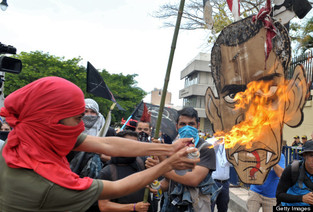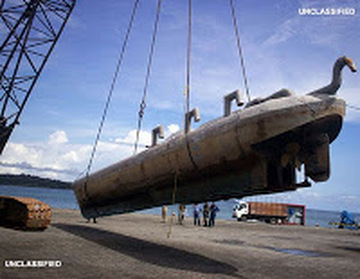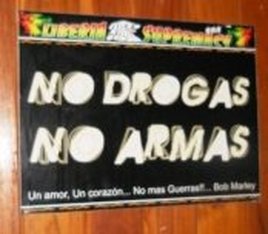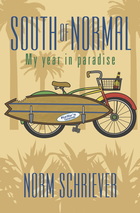
Together, they emphasized partnering to modernize Costa Rica’s economy, promote fair trade, and attract investments. But there was something that was left unsaid, an unspoken agenda not picked up on the microphones or documented by reporters: violence from the drug trade that has ravaged Mexico and Central America has started to infect Costa Rica.
It’s not the first time we’ve been concerned - back in 2011 the U.S. deployed the USS Makin Island, 46 Coast Guard ships, 42 helicopters, and 4,000 sailors to Costa Rica, a geo-political chess move that had left a lot of people scratching their heads as to why we'd give tens of millions in aid money and amass a troop presence in this sunny, politically stable, but diminutive, Central American country. The official cause for troop deployment was to help that government's effort to control the transit of drugs into their borders.
I lived in Tamarindo, Costa Rica for a year as I was writing a book and found it to be a charming, tranquillo village on the Pacific where surfboards outnumber cars, with good-hearted, smiling people. But there is a shadowy side to paradise, the game-behind the game that tourists never glimpse and gets almost no international attention. Until now.
About 1.5 million tourists and expatriates come to Costa Rica ever year to enjoy plenty of sun, sea and lush jungle, returning to the U.S. with nothing but glowing platitudes about their time in paradise. Costa Rica of only 4 million people that's as big as Vermont and New Hampshire together, who takes up only .03 percent of the landmass on the globe but enjoys over 5 percent of its biodiversity. Located between Panama to the south and Nicaragua to the north, it's often lauded as a tourist haven and socially progressive nation with a stable constitution, no army since 1949, and a high literacy rate. It also happens to be one of the biggest drug transit nations in the world -- maybe THE biggest.
An avalanche of cocaine flows into Costa Rica's borders from nearby Colombia, and, to a lesser extent, Panama, infiltrating the hundreds of miles of coastline on both the Pacific and Caribbean coasts of the country. It's estimated that 90 percent of the cocaine that ends up in the United States originates in Colombia and moves up this route -- by sea into Costa Rica, north into Nicaragua at the border at Peñas Blancas and up the Pan American Highway, or by sea up the chain of Central American countries, and then into Mexico, where the price jumps steeply in cartel hands before worm holing its way across the border into the U.S.

Although well-intentioned, to date these measures haven't been effective in slowing down the unfathomable supply of cocaine that enters their country by speedboat, fishing boat, charter plane, packed inside truck tires, in the stomachs of human drug mules, hidden inside dolls, furniture, diapers, hollowed-out bibles, disguised as humanitarian aid, and everywhere else you can imagine. It's stored in clandestine warehouses, gutted buildings, and factories where it gets "stepped on" and repackaged for distribution.
They even transport it in wooden submarines.

Whether on a speedboat or a wooden submarine, the cocaína is vacuum-sealed and dropped off in the open ocean floating in 50 gallon drums with electronic location transmitters, later to be scooped out of inlets, marshes, and estuaries by local runners in fishing boats. Believe it or not the worst occupational hazard for those pick-up men isn't cops or bullets, but crocodiles. Costa Rica has a huge croc population along its wild coast and drug runners jumping in and out of the water at night serve as a tasty snack.
But when there's a will, and a profit to be made, there's a way. The financial windfall of transporting cocaine into Costa Rica, and north up the distribution pipeline, is staggering: a kilo of cocaine that goes for about $1,700 in Columbia might be worth $23,000 once it hits the streets of the United States, cut down to 20-40 percent purity.
Most of us can only see this problem from a 10,000 foot high perspective, but I had particular insight into the drug trade in Costa Rica for another reason: unfortunately, an old friend of mine from Canada was caught and arrested growing marijuana and thrown in jail. During the year I lived there he was locked up in the prison in the small city of Liberia in Guanacaste Province, only an hour from Tamarindo, as he awaited sentencing.
He had no family and few friends in the country, so I was the only one left to take care of him. Almost every weekend I had to visit him in prison to bring him clothing, toiletries, books, money, messages from his attorney and family, and food (they only gave the prisoners about 800 calories a day, most of which is in rice and beans and hot dog buns). He was the only gringo in jail -- 1,600 prisoners and him, and when I visited I was the only Americano in attendance, too. There was no safe visiting area for us, no well-guarded room with glass partitions and phones to communicate, they just locked us in with the prisoners for those visiting hours, in their beehive of cells in general population. Before going in I'd surrender my passport and get a stamp on my arm, so they'd know I wasn't a prisoner and be allowed to leave.
"Don't sweat off that stamp or you won't get out," the prison guards told me, and I still don't know if they were kidding or being serious, but that only made me sweat more.

Eventually my friend got sentenced to 5 years for a small time marijuana infraction. He's endured riots, prisoner attacks, abuse by prison guards, and witnessed a spectrum of craziness that Hollywood couldn't even make up as the wildest fiction. But he's also seen some mercy, a ray of grace in the place you'd least expect it, good people mixed in with all of that razor wire and cold concrete, and so far he's stayed safe. I pray for his safe release soon.
All of this may sound horrifying, and lead you to the ultimate question "Does the drug trade make it dangerous in Costa Rica?" The answer is complex, but for the most part I'd say "no." Most of the problems are between rival factions involved in the drug trade, not innocent visitors. The ecosystem has a delicate equilibrium and these problems aren't even visible in the light of day. If a tourist exercises a little bit of common sense and stays clear of illegal elements, and especially drugs, they will be perfectly safe. Sure, there's crime and theft in Costa Rica, but that can be said of any city in the United States, as well. For now the country of pura vida -- pure life, is still one of the most beautiful places on earth, with friendly, sweet people, and tourists will continue to enjoy unforgettable vacations.
I have no interest in politics and it's not my place to judge anyone, from any country. I am certainly not qualified to make a statement about the three-decade long U.S. drug war in Central American and South America, but now maybe you will understand the true message behind the sound bytes about fostering partnerships and economic development.

Email me if you'd like any advice about Costa Rica, traveling abroad, or want to check out the Amazon best-selling book, South of Normal.
Check out 25 crazy facts about Costa Rica! Tamarindo, Costa Rica, surf, ski, snowboard, diving, pura vida, Central America, Nicaragua, San Juan del Sur, Amazon best seller, travel, adventure, backpack, hiking, sharks, Endless Summer, Robert August, memoir, fitness journey, globetrotting, perfect beach, paradise, spring break, expat, live abroad, work abroad, summer reading, around the world, great read, humor, laugh out loud, South of Normal, Pushups in the Prayer Room
 RSS Feed
RSS Feed